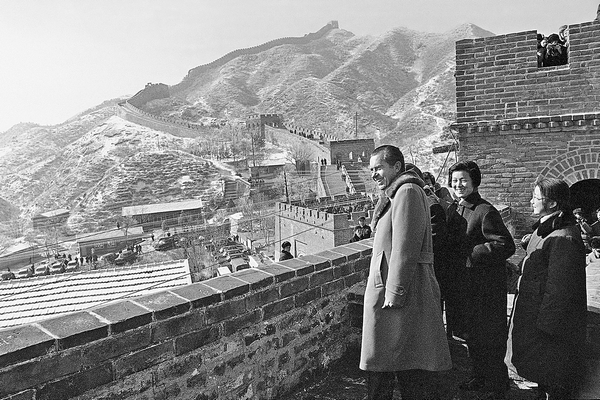

"These issues were ones that we knew cold, but they would turn out to be crucial in the decades to follow," said Platt, referring to the fact that while Nixon and Kissinger were negotiating with Zhou on all the outstanding political issues including Taiwan and a communique, he and his boss, the secretary of state Rogers, were "relegated to deal with the nuts and bolts of exchanges, trade and travel" during meetings with the then foreign minister Ji Pengfei.
What Platt could hardly imagine at the time was that he would later spend more than a decade fastening those "nuts and bolts", as president of the Asia Society in New York between 1992 and 2004.
In 1972, he, like almost everyone else in the entourage, was busy absorbing all the sights and sounds, including the mist-shrouded view of the Western Hills on which a section of the Great Wall meanders.
Poking out of the first battlement of the ancient wall-a symbol of invincibility for China-on the morning of Feb 24, 1972, Platt saw no canons or soldiers, but turrets "fully manned by American correspondents and anchormen".
Nixon and his wife were on the wall, gazing pensively into the distance while being insatiably photographed or filmed by US reporters wearing bushy fur hats, heavy coats and for some, electric socks that a duck hunter would wear. Their long johns, under which some had been baking in the overheated state halls, were finally proving to be essential.
Perfect pictures aside, Nixon was caught in what Platt dubbed a moment of "inanity". "It surely is a great wall," was all he could initially muster when asked to comment on the scene.
Yet his effort to travel more than 11,000 kilometers to be there was indeed appreciated. Right before a Peking duck dinner that evening, Platt, who was introduced to Zhou as a speaker of Chinese, was consulted by the latter on whether it would be appropriate to quote from a Mao poem in his toast to the president."He who has not been to the Great Wall is not a real man," was the line.
"Of course," Platt replied, stunned that "he had thought it worthwhile to seek out and address the most junior person in the room".
Neither Kissinger nor Lord went to the Great Wall, or the Forbidden City which the president toured the following day amid a sprinkling of snow. Both were busy working on what became to be known as the Shanghai Communique.